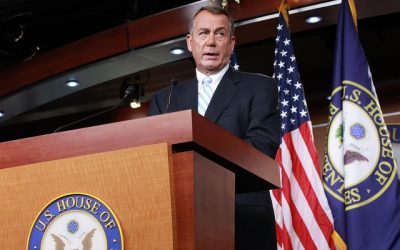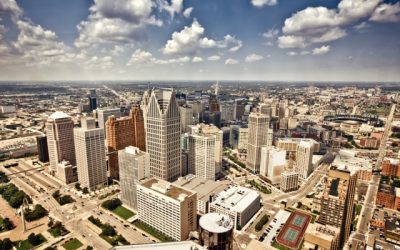Immigration Reform
The last time Congress updated our legal immigration system was November 1990, one month before the World Wide Web went online. We are long overdue for comprehensive immigration reform.
Through immigration reform, we can provide noncitizens with a system of justice that provides due process of law and a meaningful opportunity to be heard. Because it can be a contentious and wide-ranging issue, we aim to provide advocates with facts and work to move bipartisan solutions forward. Read more about topics like legalization for undocumented immigrants and border security below.
Health Worker Shortages & the Potential of Immigration Policy
Foreign-born and foreign-trained professionals play an important role in the delivery of health care in the United States. This report examines the important role of immigrant doctors and nurses – many of whom have received their training abroad – in the U.S. health industry, using new Census Bureau data as well as information from numerous interviews with health industry experts. Read More

Representantes Republicanos Presentan Principios para la Reforma Migratoria
En el día de ayer, miembros republicanos de la Cámara de Representantes dieron a conocer los principios generales sobre los que basarán su propuesta de reforma migratoria en dicha Cámara. El documento de una página, divulgado durante el retiro anual de los representantes republicanos en Cambridge (Maryland), aborda temas que van desde la seguridad fronteriza y la verificación de empleo, hasta los cambios en el sistema de inmigración legal y la regularización de inmigrantes indocumentados. Read More

Are GOP Immigration Standards Enough to Shake Up the Conversation?
Reactions to the release of the House GOP leadership’s principles for immigration reform ranged from ecstatic to furious yesterday—and that was just within the Republican Party. Outside the tortured world of House politics, reactions tended more toward cautious praise for releasing something as a starting point, but with serious doubts about the shortcomings of the actual policy proposals. Because these principles are guidelines—without specific detail—“cautious optimism” is probably the healthiest approach to take in understanding what the document means for reform. Summarizing what the document says doesn’t take long; understanding its nuances, particularly its omissions and departures from the past, requires a bit more digging. Read More

Draft of GOP Principles on Immigration Reform Released
A draft of the House Republican principles on immigration reform has been released as House GOP members gather for their retreat to discuss their position on a range of issues, including immigration. Standards for Immigration Reform PREAMBLE Our nation’s immigration system is broken and our laws are… Read More

SOTU Shows Parties Moving Closer on Immigration Reform
During Tuesday night’s State of the Union address, President Obama made it clear that improved immigration policies go hand-in-hand with the economic recovery, and nudged the House of Representatives to make the next move on immigration reform. Read More

Without Citizenship, Immigration Reformers Could be Leaving Dollars on the Table
While President Obama’s State of the Union Address will reportedly focus on income inequality in the United States, it is also a likely bet that he will address the economic benefit of immigration reform even as Republicans are finalizing their immigration principles. As conversations around immigration reform proposals forge ahead, the economic benefits of citizenship versus simply providing legal status should not be overlooked. According to a new Center for American Progress (CAP) report, The Economic Case for a Clear, Quick Pathway to Citizenship, there is an important citizenship premium that should be factored in to economic calculations of reform. According to the report, the premium is “the bump to a country’s economy that arises after immigrants become citizens. This bump comes in the form of higher wages and more tax revenue collected from naturalized citizens, all of which spurs more overall economic activity.” Read More

Immigration Reform and the State of the Union
Washington D.C. – Tonight, President Barack Obama pressed the reset button and laid out his priorities for 2014—and, ultimately, the final leg of his presidency. During the State of the Union address, the President discussed the need to create jobs and greater opportunity for all. He also made it clear… Read More

Senator Jeff Sessions Has Erroneously Blamed Immigrants for U.S. Income Inequality
Despite the formal end of the recession in 2009, unemployment in the United States remains high, wages are still stagnant, and economic indices of all kinds are looking grim. A crisis of this magnitude requires bold action by U.S. lawmakers to realign U.S. economic policies in ways that promote the growth of both jobs and wages. Economists across the political spectrum agree that immigration reform—including a pathway to legal status for unauthorized immigrants already living here—should be a central part of any such effort to boost the economy. Nevertheless, Sen. Jeff Sessions (R-AL) thinks he knows better. In his opinion, what we need to do to alleviate the nation’s economic woes is to derail immigration reform. Apparently, if we can hang on to our broken immigration system a little longer, there will be brighter days ahead for the U.S. economy. Read More

Michigan to Immigrants: You’re Welcome Here
It is clear that Michigan Gov. Rick Snyder understands that immigration can be a potent boost to his state’s economy. It’s also an important component of economic revitalization for a city such as Detroit. Improving the nation’s broken immigration system could have enormous economic benefits for Michigan and states across the country, so Snyder joined former New York City Mayor Michael Bloomberg and former Secretary of Commerce Carlos Gutierrez, in Washington Friday to continue urging lawmakers to overhaul the U.S. immigration system. As Gutierrez explained, “Our laws aren’t serving our economy.” And Bloomberg noted that it is terrible economic policy to turn away foreign born entrepreneurs and innovators while also making it difficult for foreign-born graduates to remain in the country after earning degrees from our colleges and universities. State leaders recognize this as well, but they also know upgrading immigration laws requires congressional action. “We need comprehensive immigration reform. Bottom line,” Snyder said Friday. “To be blunt, we have a dumb system.” Read More

What Does the Anti-Immigrant Movement Have Planned for the States in 2014?
As Congress continues their protracted debate on immigration reform, state governments are taking the lead on moving positive measures forward. Thus, anti-immigrant groups like the Federation for American Immigration Reform and Numbers USA will be on the defensive in 2014, devoting time and resources towards preventing pro-immigrant state policies from taking root. They are certain to keep their eyes on the federal debate this year however, they have made public their intent to help repeal driver’s licenses for undocumented immigrants in Oregon, organize against the Maryland TRUST Act (they were behind efforts to stop Maryland’s DREAM Act in 2012), and work where they can to block Deferred Action for Childhood Arrivals (DACA) recipients from accessing driver’s licenses and higher education. Read More
Make a contribution
Make a direct impact on the lives of immigrants.
